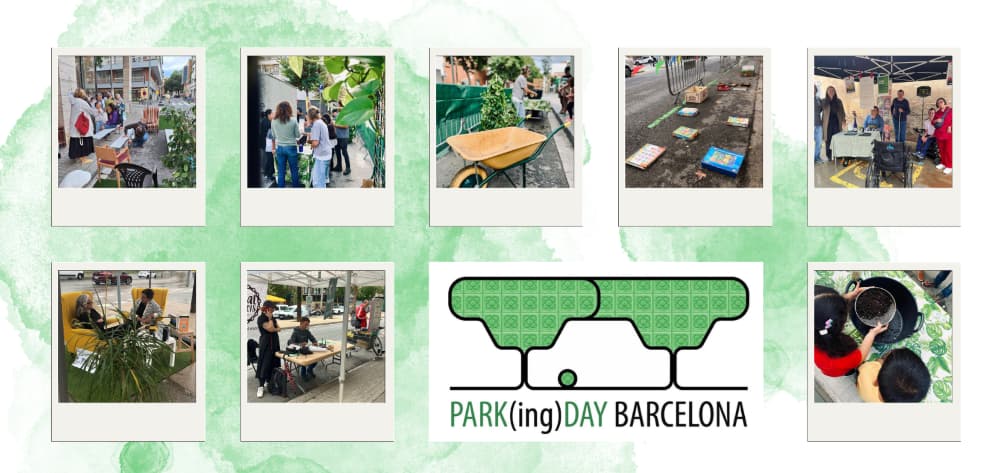74 Organisations Join Park(ing) Day Barcelona to Claim an Alternative Model of a City
The citizens’ movement was the central axis of the tenth anniversary of Park(ing)Day Barcelona, which gave visibility to neighborhood cohesion as an engine of change in the city.
20.09.2024
On Friday, September 20, Barcelona hosted a new edition of Park(ing) Day Barcelona, an initiative coordinated by the Barcelona Institute for Global Health (ISGlobal) and Espai Ambiental Cooperativa, with funding from the Barcelona City Council, and the collaboration of EIT Urban Mobility. The day calls for a healthier and more sustainable urban model through multiple initiatives of the participating organizations, which transform parking spaces into meeting spaces, gardens and other alternative uses of public space.
“Like many other cities in the world, Barcelona has a major problem: pollution from motorised vehicle traffic and the consequent degradation of public space and the environment,” says Nahuel Osorio, a member of Espai Ambiental Cooperativa. The initiative also seeks to highlight the impact of urbanism on human health and the need to take urgent measures to prevent the consequences of pollution in cities. “Air pollution is the main environmental factor with the greatest impact on human health and in urban areas the greatest contribution comes from motorised transport. At the local level, Barcelona is the sixth European city with the highest burden of mortality associated with air pollution, making it urgent to rethink urban planning to protect the health of its inhabitants”, says Pamela Blanche, science disseminator at ISGlobal.
This year we celebrated the tenth edition with the participation of 74 entities that occupied a total of 86 parking spaces with different types of installations. The entities, which belong to diverse fields (cultural, artistic, social and solidarity economy, feminism or urbanism, among others) have offered a wide program of activities. These included workshops, talks, intergenerational shows and informative spaces on urban planning, climate change and health. Barcelona's libraries were particularly involved, offering reading spaces for children and adults.
Citizens' movement: for a more cohesive Park(ing)Day
In 2024, the citizen movement as a driving force for change in the urban model was the central focus of Park(ing) Day Barcelona. Half of the participating entities were grouped by neighborhoods, reflecting social cohesion and community effort. In numbers, 16 of the 38 locations were organised by groups of 2 to 9 district entities. This tenth edition focused on the contribution that each participating entity makes individually and the impact they achieve when organized and presented collectively.
Park(ing) Day seeks to encourage citizens to reclaim public space, offering an opportunity to generate meetings, debates and make socio-environmental issues visible. The occupation of parking spaces is intended to raise awareness and give voice to the initiatives and ideas of Barcelona's neighbors on the use of public space. Activities included workshops on sustainable transport, road safety, accessible spaces for all, children's areas, urban renaturalization initiatives and climate emergency.
Despite heavy rains on Friday, enthusiasm remained high among participants. Many adapted their activities and found creative ways to make the most of the day, ensuring that the event’s message to reclaim urban spaces for community use stayed front and centre.
This edition of Park(ing)Day was organized in collaboration with EIT Urban Mobility, an initiative of the European Institute of Innovation and Technology (EIT), a European Union agency, whose main objective is to provide innovative solutions and accelerate the transition to a multimodal, integrated and user-centered transport system. “Cities must be designed by and for citizens, it is necessary a transformation of cities that today are designed around cars, sacrificing living space, clean air and quality of life. This is why EIT Urban Mobility is leading this transformation by providing cities with tools, solutions and the innovative ecosystem that make change possible,” says María Paula Caycedo, director of the South Innovation Hub at EIT Urban Mobility.



